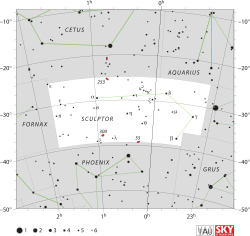|
| Eta Sculptoris (η) |  | Observationsdata
Epok: J2000.0 |
|---|
| Stjärnbild | Bildhuggaren |
|---|
| Rektascension | 00t 27m 55,69870s[1] |
|---|
| Deklination | -33° 00′ 25,7977″[1] |
|---|
Skenbar magnitud ( ) ) | +4,8-4,9 (V)[2] |
|---|
| Stjärntyp |
|---|
| Spektraltyp | M4 III[3] |
|---|
| U–B | +1,81[2] |
|---|
| B–V | +1,634±0,035[4] |
|---|
| Variabeltyp | Halvregelbunden variabel (SR)[5] |
|---|
| Astrometri |
|---|
Radialhastighet ( ) ) | 12,10 ± 1,7[6] km/s |
|---|
| Egenrörelse (µ) | RA: -20,349 ± 0,362[5] mas/år
Dek.: 49,911 ± 0,292[5] mas/år |
|---|
Parallax ( ) ) | 7,0975 ± 0,2769[5] |
|---|
| Avstånd | 460 ± 20 lå (141 ± 5 pc) |
|---|
Absolut magnitud ( ) ) | -0,83[7] |
|---|
| Detaljer |
|---|
| Radie | 32,22[8] R☉ |
|---|
| Luminositet | 1 082[9] L☉ |
|---|
| Temperatur | 3 621[9] K |
|---|
| Andra beteckningar |
|---|
| GCRV 251, JP11 389, SAO 192545, GEN# +1.00002429, 2MASS J00275566-3300257, SKY# 768, CD-33 152, GSC 06994-01104, N30 84, SRS 40073, CPC 17 162, HD 2429, PLX 75, TYC 6994-1104-1, CPD-33 48, HIC 2210, PLX 75.00, UBV 340, CSV 5855, HIP 2210, PMC 90-93 1185, UBV M 7390, FK5 2026, HR 105, PPM 276040, DS98 8, GC 544, IRAS 00254-3317, RAFGL 70, MBT64 94[10] |
Eta Sculptoris (η Sculptoris, förkortat Eta Scl, η Scl) är en ensam stjärna[11] belägen i den mellersta delen av stjärnbilden Bildhuggaren. Den har en genomsnittlig skenbar magnitud på 4,81[2] och är synlig för blotta ögat där ljusföroreningar ej förekommer. Baserat på parallaxmätning inom Hipparcosuppdraget på ca 7,1[5] mas, beräknas den befinna sig på ett avstånd på ca 460 ljusår (ca 141 parsek) från solen.
Egenskaper
Eta Sculptoris är en röd till orange jättestjärna i huvudserien av spektralklass M4 III[3]. Stjärnan en radie som är ca 32[8] gånger större än solens och utsänder från dess fotosfär ca 1 100[9] gånger mera energi än solen vid en effektiv temperatur av ca 3 600[9] K.
Eta Sculptoris är en halvregelbunden variabel av SR-typ[12]. Den varierar mellan visuell magnitud +4,8 och 4,9[12] och pulserar med flera perioder med 22,7, 23,5, 24,6, 47,3, 128,7 och 158,7 dygn.[13]
Se även
Referenser
- Den här artikeln är helt eller delvis baserad på material från engelskspråkiga Wikipedia, tidigare version.
Noter
- ^ [a b] Van Leeuwen, F. (2007). "Validation of the new Hipparcos reduction". Astronomy and Astrophysics. 474 (2): 653. arXiv:0708.1752. Bibcode:2007A&A...474..653V. doi:10.1051/0004-6361:20078357. Vizier catalog entry
- ^ [a b c] Ducati, J. R. (2002). "VizieR Online Data Catalog: Catalogue of Stellar Photometry in Johnson's 11-color system". CDS/ADC Collection of Electronic Catalogues. 2237. Bibcode:2002yCat.2237....0D.
- ^ [a b] Hoffleit, D.; Warren, W. H. (1995). "VizieR Online Data Catalog: Bright Star Catalogue, 5th Revised Ed. (Hoffleit+, 1991)". VizieR On-line Data Catalog: V/50. Originally published in: 1964BS....C......0H. 5050. Bibcode:1995yCat.5050....0H.
- ^ van Leeuwen (2007). ”Hipparcos, the New Reduction” (på engelska). http://vizier.u-strasbg.fr/viz-bin/VizieR-5?-out.add=.&-source=I/311/hip2&HIP=2210. Läst 17 december 2017.
- ^ [a b c d e] Brown, A. G. A.; et al. (Gaia collaboration) (August 2018). "Gaia Data Release 2: Summary of the contents and survey properties". Astronomy & Astrophysics. 616. A1. arXiv:1804.09365. Bibcode:2018A&A...616A...1G. doi:10.1051/0004-6361/201833051. Gaia DR2 record for this source at VizieR.
- ^ Gontcharov, G. A. (2006). "Pulkovo Compilation of Radial Velocities for 35 495 Hipparcos stars in a common system". Astronomy Letters. 32 (11): 759. arXiv:1606.08053. Bibcode:2006AstL...32..759G. doi:10.1134/S1063773706110065.
- ^ Anderson, E.; Francis, Ch. (2012). "XHIP: An extended hipparcos compilation". Astronomy Letters. 38 (5): 331. arXiv:1108.4971. Bibcode:2012AstL...38..331A. doi:10.1134/S1063773712050015. Vizier catalog entry
- ^ [a b] https://www.universeguide.com/star/etasculptoris. Hämtad 2018-12-20.
- ^ [a b c d] McDonald, I.; Zijlstra, A. A.; Boyer, M. L. (2012). "Fundamental parameters and infrared excesses of Hipparcos stars". Monthly Notices of the Royal Astronomical Society. 427: 343. arXiv:1208.2037. Bibcode:2012MNRAS.427..343M. doi:10.1111/j.1365-2966.2012.21873.x. Vizier catalog entry
- ^ ”Basic data: V* Eta Scl – Long-period variable star” (på engelska). Centre de Données astronomiques de Strasbourg. http://simbad.u-strasbg.fr/simbad/sim-basic?Ident=Eta+Scl&submit=SIMBAD+search. Läst 17 december 2017.
- ^ Eggleton, P. P.; Tokovinin, A. A. (September 2008). "A catalogue of multiplicity among bright stellar systems". Monthly Notices of the Royal Astronomical Society. 389 (2): 869–879. arXiv:0806.2878. Bibcode:2008MNRAS.389..869E. doi:10.1111/j.1365-2966.2008.13596.x.
- ^ [a b] ”Eta Scl” (på engelska). The International Variable Star Index. AAVSO – American Association of Variable Star Observers. http://www.aavso.org/vsx/index.php?view=detail.top&oid=34115. Läst 17 december 2017.
- ^ Tabur, V.; Bedding, T. R. (2009). "Long-term photometry and periods for 261 nearby pulsating M giants". Monthly Notices of the Royal Astronomical Society. 400 (4): 1945–61. arXiv:0908.3228. Bibcode:2009MNRAS.400.1945T. doi:10.1111/j.1365-2966.2009.15588.x.
Externa länkar
|





